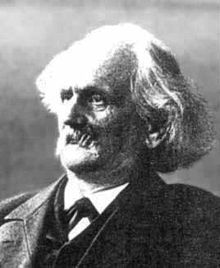Carl Neumann
| Carl Neumann | |
|---|---|
 |
|
| Born |
7 May 1832 Königsberg, Prussia |
| Died | 27 March 1925 (aged 92) Leipzig |
| Nationality | German |
| Fields | integral equations |
| Institutions |
University of Halle-Wittenberg University of Basel University of Tübingen University of Leipzig. |
| Alma mater |
Königsberg University Halle |
| Doctoral advisor | Friedrich Richelot and Otto Hesse |
| Doctoral students | William Edward Story |
| Known for |
Dirichlet problem Neumann series |
Carl Gottfried Neumann (7 May 1832 – 27 March 1925), also Karl Gottfried Neumann, was a German mathematician.
Neumann was born in Königsberg, Prussia, as the son of the mineralogist, physicist and mathematician Franz Ernst Neumann (1798-1895), who was professor of mineralogy and physics at Königsberg University. Carl Neumann studied in Königsberg and Halle and was a professor at the universities of Halle, Basel, Tübingen, and Leipzig.
While in Königsberg, he studied physics with his father, and later as a working mathematician, dealt almost exclusively with problems arising from physics. Stimulated by Bernhard Riemann's work on electrodynamics, Neumann developed a theory founded on the finite propagation of electrodynamic actions, which interested Wilhelm Eduard Weber and Rudolf Clausius into striking up a correspondence with him. Weber described Neumann's professorship at Leipzig as for "higher mechanics, which essentially encompasses mathematical physics," and his lectures did so.Maxwell makes reference to the electrodynamic theory developed by Weber and Neumann in the Introduction to (1864).
Neumann worked on the Dirichlet principle, and can be considered one of the initiators of the theory of integral equations. The Neumann series, which is analogous to the geometric series
...
Wikipedia
